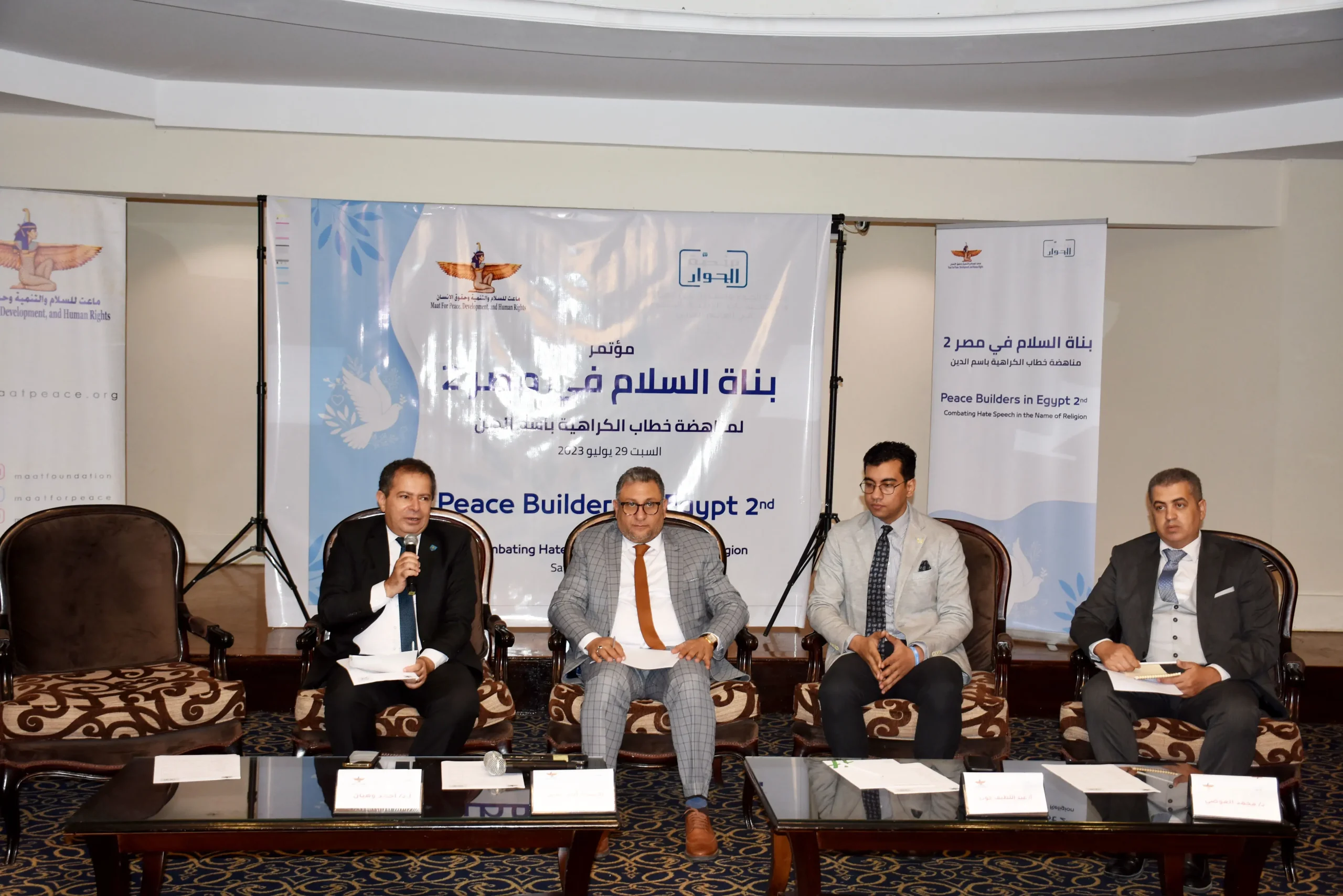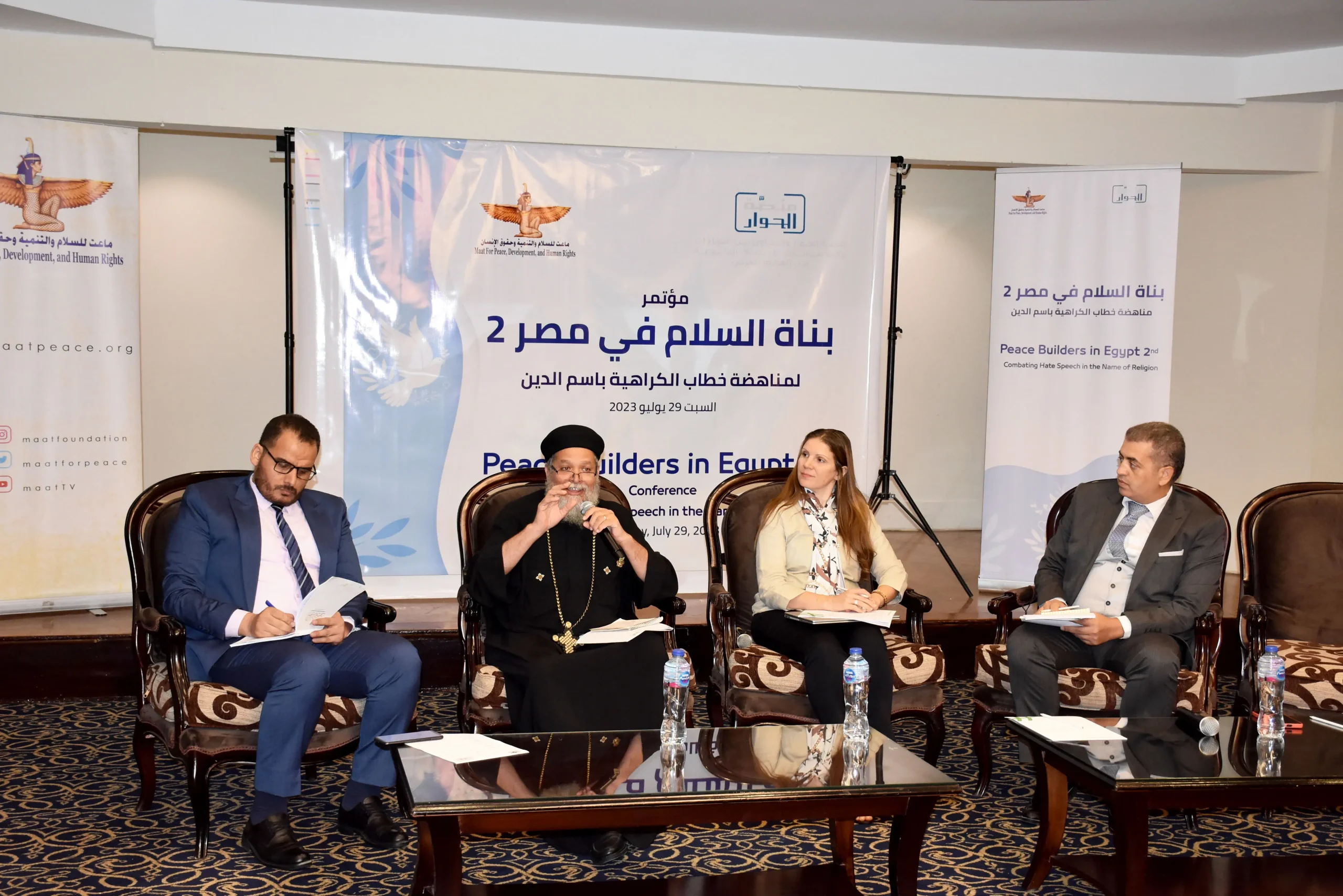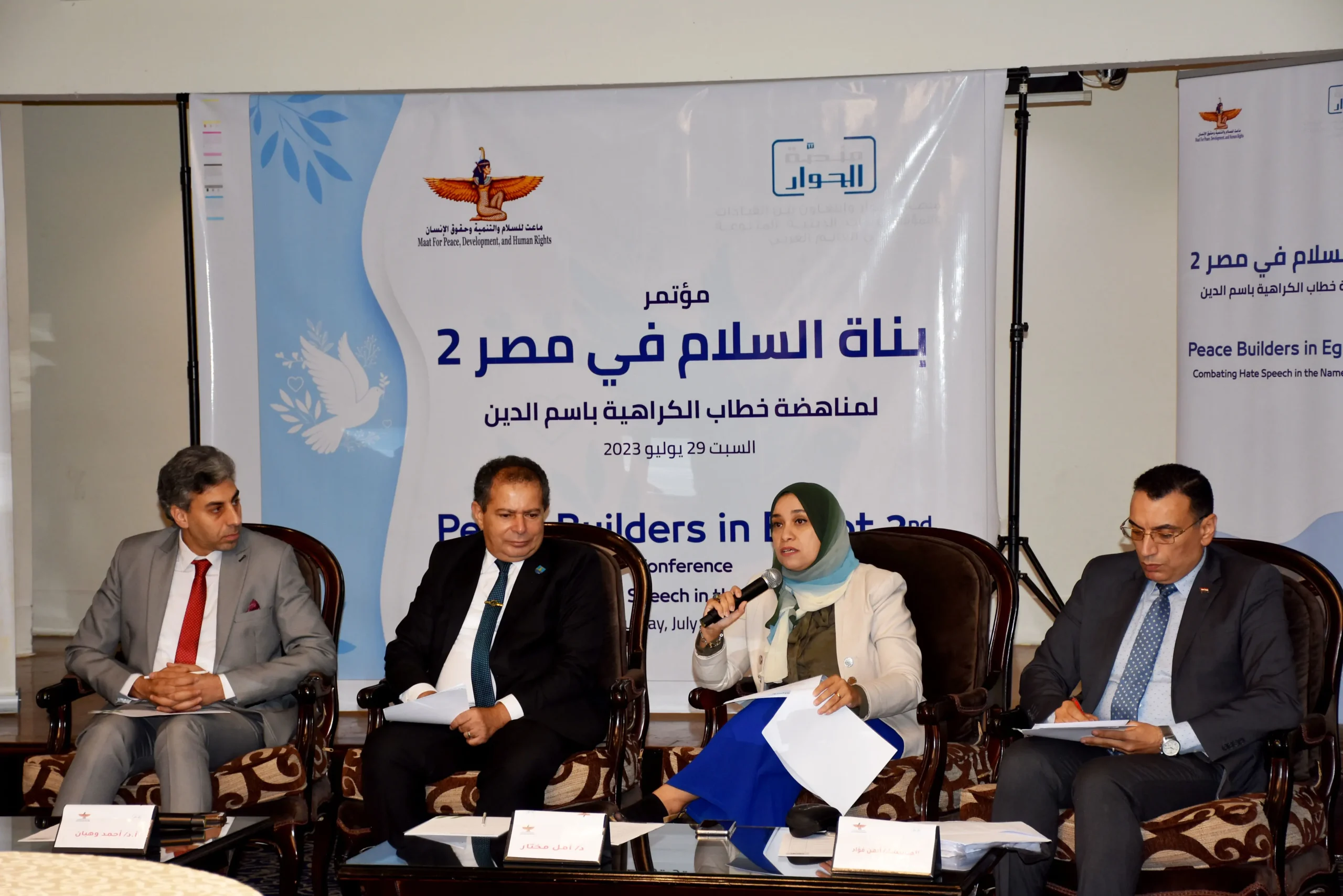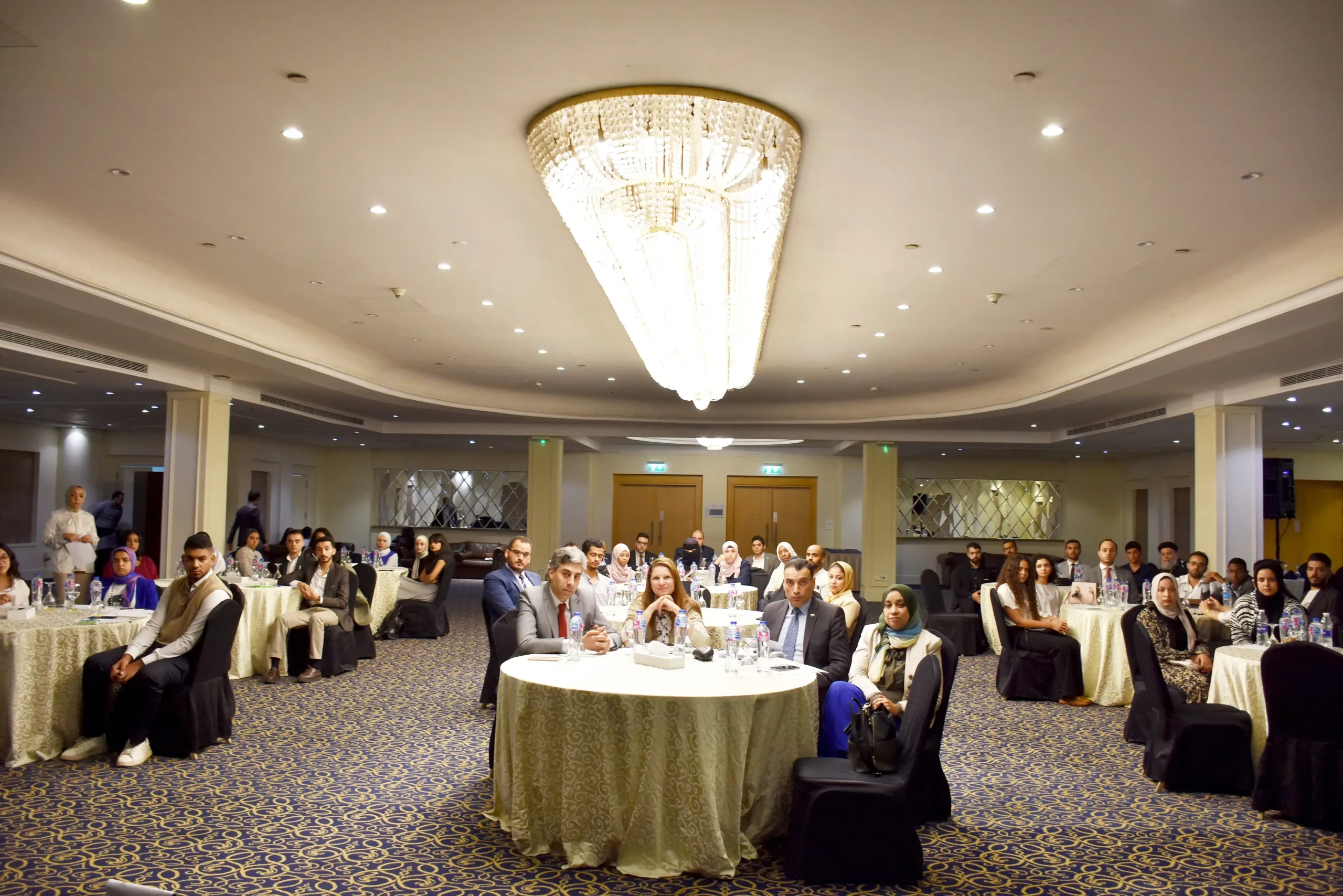Okeil: The role of civil society must be expanded especially in light of the continuation of armed conflicts in the Arab region
Father Matta Zakaria: Hate speech is millions of times 'deadlier' than viruses, and dialogue should be adopted instead of quarrels
Shaaban: Communication has become a deadly weapon in the hands of terrorist organizations
Maat for Peace, Development and Human Rights concluded the "Peace Builders in Egypt 2" Project that is carried out by Maat in cooperation with the International Dialogue Centre (KAICIID) with a closing conference attended by representatives from Al-Azhar, the Church, CSOs and experts in the field of combating hate speech. Mr. Ayman Okeil, Chairman of Maat, opened the Conference with his statement on developing national and regional strategies to combat hate speech and violent extremism. The first session of the Conference discussed "National Policies and Legislations to Confront Hate Speeches", a research paper prepared by Dr. Amal Mukhtar, a senior researcher on extremism and violence at Al-Ahram Center for Political and Strategic Studies, and it was moderated by Prof. Ahmed Wahban, Dean of the Faculty of Economic Studies and Political Science, and commented on by Dr. Ahmed Sayed, Professor of political science at Alexandria University.
The second session addressed the role of the media and advocacy to combat hate speech; it discussed the working papers prepared by Dr. Engy Abu Al-Ezz, Professor of Radio and Television at the Faculty of Mass Communication, and Counselor Ayman Fouad, a Human Rights Expert. This session was moderated by Dr. Muhammad Al-Awadi, a Supervisor at the Al-Azhar Observatory and commented on by both Dr. Hamada Ismail, a Supervisor at Al-Azhar Observatory for Combating Extremism and Father Matta Zakaria, representative of the Coptic Orthodox Church.
In this context, Ayman Okeil, an International Human Rights Expert and Chairman of Maat, stressed the growing necessity to enable CSOs and expand their role so that they would work to spread peace and combat hate speech, especially in light of the continuation of armed conflicts in the Arab region. In addition, Okeil stressed Maat’s ongoing efforts to cooperate with other organizations and actors concerned with combating hate speech and spreading a culture of tolerance and coexistence, and affirmed the Association’s willingness to adopt any societal initiatives in this regard, with the aim to improve the intellectual environment there young people grow up.
For his part, Father Matta Zakaria, Patron of the Virgin Mary Coptic Orthodox Church in Marsa Matrouh, in Egypt, and representative of the Orthodox Church, warned that hate speech is millions of times 'deadlier' than viruses, as its repercussions spread widely and cannot be controlled. Although awareness efforts begin at home, it is also a responsibility shared by all state institutions including schools, universities, and media, among others. His Holiness, Pope, taught us, Father Zakaria added, that human interactions take three forms; the first is quarrel, we disagree and fight, the second is building walls, we isolate ourselves to avoid quarrels; and this third is dialogue, which is the best among all; therefore, the first step is continuous encouragement for there to be sustainable dialogue.
During the conference, Prof. Ahmed Wahban, Dean of the Faculty of Economic Studies and Political Science at Alexandria University, stressed that experts are only concerned about people's well-being, but hate speech remains an alarming threat, especially hatred in the name of religion, as it channels hatred and anger to people's beliefs while in fact, all religions are far from such ideologies and practices.
Prof. Amal Mukhtar, a senior researcher on extremism and violence at Al-Ahram Center for Political and Strategic Studies, explained that hate speech in the name of race is particularly difficult, as it erases all borders, such as the far right, white supremacy, Nazi arrogant discourse, and extremist Islamic organizations.
Counselor Ayman Fouad, a human rights expert, stressed the urgent need for a national and regional commission to combat hate speech which growth gives rise to other dangerous phenomena such as violent extremism and may sometimes develop into xenophobia and fear of everything that is different. Dr. Ahmed Al-Sayed, a professor of political science at the University of Alexandria, highlighted the need to a legal discourse with a comprehensive definition of hate speech, and to establish an independent commission to combat discrimination as stipulated in the Constitution, noting that the problem is no longer only in texts, but in interpretation thereof as well.
Dr. Engy Abu Al-Ezz, Professor of Radio and Television at the Faculty of Mass Communication, said that the media is a double-edged sword in combating hate speech, whether traditional media or modern forms such as social networks. Besides, the media practice may go in the wrong direction, and become a promoter instead of being a tool to refute it.
While Dr. Hamada Shaaban, supervisor of the Al-Azhar Observatory for Combating Extremism, stated; Mosul fell years ago with the weapon of Twitter before the real weapon, so while we ignore the policy of media dumping, we leave that space for terrorism to enter our societies from it, which threatens societies and human security. Communicate by deleting any hateful content, as Europe did, and we must also pay attention to the vocabulary of media professionals, and be aware of the purpose of popular publications, with the comments that follow, so that a number of hate speeches collects more than the main text itself.
Finally, Abdul Latef Gouda, Director of the Unit for Countering Hate Speech and Violent Extremism at Maat, confirmed that the Peace Builders Project in Egypt will continue to hold meetings with thinkers, experts, and stakeholders to take their views into account, with the aim of strengthening efforts seeking to address the phenomena that have a negative impact on society safety and security.
It is worth noting that Maat is carrying out the "Peace Builders in Egypt" Project, funded by the King Abdullah bin Abdulaziz International Centre for Interreligious and Intercultural Dialogue, mostly referred to as "International Dialogue Centre" (KAICIID), in two editions; the first targeted training university students to combat hate speech in the name of religion, and the Association helped the target group of the project to implement 3 community initiatives as outputs of the project; while the second, targeted the representatives of 15 civil society organizations within the governorates of Greater Cairo.
shortlink: https://maatpeace.org/en/?p=39339















